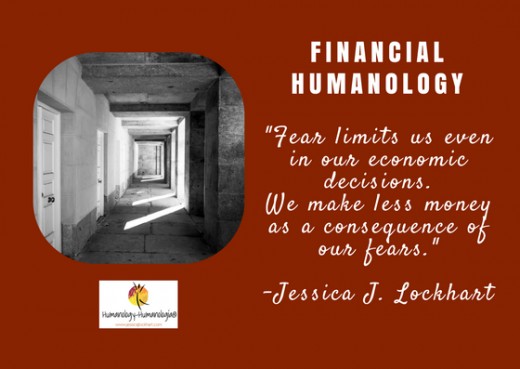Fear in Financial Humanology
Fear limits us even in our economic decisions

Fears are beliefs that have the power to control and paralyze us in every aspect of our lives.
In a society in which not having money is mostly considered something negative ranging from bad taste to complete recklessness, fears related to the economy, to savings or to currencies play a fundamental role and can change a person's future. In other cultures and societies in which not having money is seen as fate or destiny, fears related to making money or keeping it also play a fundamental role and can change a person's future. One could therefore deduce that fears related to wealth can impact human beings all around the world. In fact, they do!
Fear is always a manifestation of a strongly held belief. If a person fears an animal, a dog for instance, it is because that person holds the belief that it might be dangerous. In the economic and monetary fields, some of those beliefs are easy to pinpoint:
- 'I am afraid to lose my money because I know what happens then. My parents went bankrupt when I was a kid.'
- 'I fear my future because I was born in a poor neighbourhood and nobody ever made it out of it.'
- 'I'm afraid to invest in risky businesses because I don't want to have to resort to public services in my old age.'
All those fears are clearly based on long-held beliefs:
- Going bankrupt or losing money leads to problems.
- Getting out of the place we are born in is impossible.
- Risking savings leads to poverty.
The stronger the fear, the more limiting it becomes.
Some of those beliefs were created in childhood and became stronger and more solidly established in the person's mind as years went by. Some are learnt in the family, by imitating adults and important role models in our lives. Others are learnt in school, church or any other environment of influence in our early years. Beliefs, though, are created, changed, strengthened and altered constantly throughout life. New ones can be established at any time and old ones replaced in the blink of an eye. Some can be expressed as opinions, ideas or convictions, others are less obvious. Beliefs can become so ingrained in us, that they might disappear from our consciousness and become subconscious. When this happens, we base our decisions on beliefs that we're not even aware we have!
As humanologists, we understand that those beliefs and fears can limit our clients when trying to invest or make monetary decisions. All human beings base their decisions on their beliefs. That is what beliefs are for. Unfortunately, not all beliefs help or empower us. Certain beliefs limit us in many ways. Let's imagine a situation in which the parents in a family need to decide how to best invest their savings. Even if they have a financial family planner, their opinion will prevail. Fears should be considered, questioned and managed before really choosing the best decision, shouldn't they?
Even people in command of bigger amounts of money can suffer from limiting beliefs and fears. In companies, that could mean avoiding certain types of investments or monetary moves. The person in charge, affected by those subconscious opinions, would simply find other ways to invest. The problem with that is the lack of real choice. By limiting the options, the company loses.
Unfortunately, it's sometimes not enough to know that those fears and beliefs exist. As mentioned before, others might be subconscious and hard to pinpoint. Furthermore, replacing well established convictions is no easy task and professional guidance and tools might be needed. Whenever applying humanology tools to private and company situations, fears are addressed to prevent limiting beliefs from curtailing their ability to decide and choose. They are identified, questioned and, if so decided, replaced. How can it be any other way? All important decisions should be taken only after making sure that limiting beliefs and fears are neutralized, thus offering greater possibilities and a wider range of options. Thus, if you or your company need to make significant monetary or economic decisions, work hand in hand with a financial humanologist to make sure that all those limitations are overcome. Don't block yourselves and really open the door fearlessly to the complete range of choices.
Enjoy life... ALL of it,
Jessica J. Lockhart - humanology
© 2018 Jessica J Lockhart








